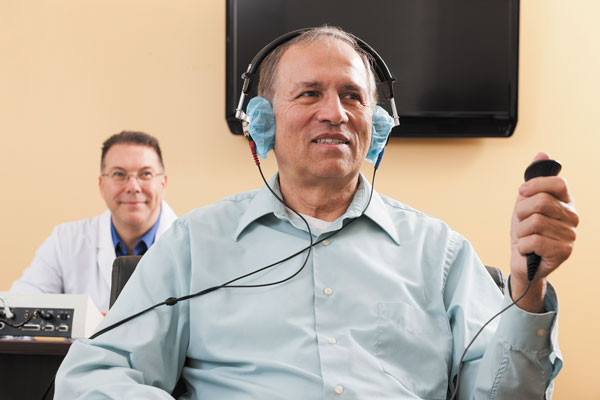
Avocado nutrition: Health benefits and easy recipes

Swimming lessons save lives: What parents should know

Preventing and treating iliotibial (IT) band syndrome: Tips for pain-free movement

Wildfires: How to cope when smoke affects air quality and health

What can magnesium do for you and how much do you need?

Dry socket: Preventing and treating a painful condition that can occur after tooth extraction

What happens during sleep �� and how to improve it

How is metastatic prostate cancer detected and treated in men over 70?

Could biofeedback help your migraines?

What is autism spectrum disorder?
Men's Health Archive
Articles
Don’t tolerate food intolerance
Here's what to do when certain foods disagree with you.
��Image: ChesiireCat/Thinkstock
You probably remember an occasion when you ate something that did not agree with you. But if your stomach issues have become severe and frequent, you might have a food intolerance.
"Food intolerances puzzle many older men, since foods they long enjoyed suddenly give them problems," says Evagelia Georgakilas, a registered dietitian and nutritionist with Harvard-affiliated Beth Israel Deaconess Medical Center. "They might tough it out and suffer in silence, but by identifying the problem foods, making adjustments in portion sizes, and switching out certain foods as needed, they can avoid painful and recurring digestive issues."
Boning up on osteoporosis
The disease strikes more women, but men are also at risk.
Osteoporosis is often considered a woman's disease, but men also need to be concerned about this bone-weakening condition. About 2 million men have osteoporosis and another 12 million are at high risk, according to the National Osteoporosis Foundation.
In fact, older men have a greater risk for an osteoporosis-related fracture than for getting prostate cancer, and about one in four men older than 50 will break a bone because of osteoporosis during his lifetime.
New approach identifies returning prostate cancer
Researchers have mapped patterns of prostate cancer recurrence following surgery, which may help doctors find the best way to treat men whose cancer has returned. About 30% of men who have prostate cancer surgery will have a recurrence, according to the study in the Journal of Urology.
When is it okay to split medication in half?
Splitting a pill into two equal halves is sometimes necessary when needing to adjust dosage, or as a means to save money buy purchasing higher-dose pills. However, splitting is not safe for all pills, so a person should always consult a pharmacist or doctor.
Looking for a few good men
There are many opportunities to join a clinical trial, and you may be surprised at what you can learn about your health.
��Image: ggustavofrazao/Thinkstock
You no doubt have seen advertisements asking people to join a clinical trial and thought they don't apply to you. But perhaps you should reconsider.
"People have a vested interest in the outcome of research trials, since these studies address many issues they want to avoid or better manage, such as cancer, diabetes, blood pressure, and dementia," says Dr. Howard Sesso, an epidemiologist with the division of preventive medicine at Harvard-affiliated Brigham and Women's Hospital.
Shortened radiation therapy may help with low-risk prostate cancer
A new study found that men with low-risk prostate cancer may be able to undergo a shortened course of radiation therapy that cuts treatment by weeks and offers similar outcomes and quality-of-life results as longer treatment courses.
Drugs to prevent heart attacks may also lessen their severity
Medications such as aspirin, statins, ACE inhibitors, and beta blockers are prescribed to certain patients to lower the chance of a first or repeat heart attack. New research shows that they also may reduce the severity of attacks that do occur.
Now hear this: You may need hearing aids
These tiny devices can improve your communication, your relationships, and even your brain function, but only if you use them.��
��Image: Huntstock/Thinkstock
Age-related hearing loss affects about a quarter of people ages 65 to 74 and half of those ages 75 and older, according to the National Institute on Deafness and Other Communication Disorders. Over all, though, it tends to be more male-oriented.
“By middle age, many men also have hearing nerve damage from long exposure to noises like power tools, music, and guns,�� says Dr. Steven Rauch, an otologist with Harvard-affiliated Massachusetts Eye and Ear. Some career choices—like construction, manufacturing, or military service—also contribute.
Women now drink almost as much as men, according to global survey
Alcohol consumption, problem drinking, and alcohol-related health problems are almost as high among women as among men born in the late 1990s.
Immediate radiation when PSA levels spike after prostate cancer surgery helps reduce risk of recurrence
After prostate cancer surgery, the patient’s prostate-specific antigen (PSA) is monitored by his doctor via a simple blood test. New research indicates that if the PSA increases following surgery, immediate radiation therapy can reduce the risk of cancer recurrence.

Avocado nutrition: Health benefits and easy recipes

Swimming lessons save lives: What parents should know

Preventing and treating iliotibial (IT) band syndrome: Tips for pain-free movement

Wildfires: How to cope when smoke affects air quality and health

What can magnesium do for you and how much do you need?

Dry socket: Preventing and treating a painful condition that can occur after tooth extraction

What happens during sleep �� and how to improve it

How is metastatic prostate cancer detected and treated in men over 70?

Could biofeedback help your migraines?

What is autism spectrum disorder?
Free Healthbeat Signup
Get the latest in health news delivered to your inbox!
Sign Up







